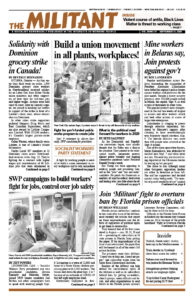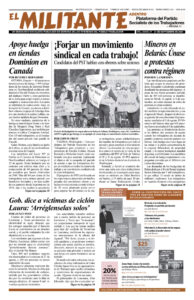STONEHAVEN, Scotland — “No one should lose their life at work,” Stonehaven resident Jim Cattanach told the Militant, after two rail workers and a passenger were killed when a train derailed here south of Aberdeen Aug. 12. A government cover-up of the cause of the deaths began to unravel as trade unionists and relatives of those killed spoke out.
Train conductor Douglas Dinnie, driver Brett McCullough and passenger Christopher Stuchbury were killed when the train they were on hit a landslide caused by a torrential rain. Rail bosses had refused to cancel the service despite the enormous amount of rain falling in just four hours in an area of track with a recent record of landslides.
Trying to shield rail bosses from blame, U.K. Prime Minister Boris Johnson and Scottish government Transport Secretary Michael Matheson said the cause was a natural disaster. Bosses and government officials also tried to shift blame onto the workers.
Within days Salina McCullough, the sister of the driver, exposed the lies. “They killed him, not the landslide,” she told the Scottish Mail. “During one of the worst storms to hit Scotland, they sent my brother out.”
Trains from Aberdeen “were mostly cancelled but one question has to be asked, why all trains were not stopped?” Manuel Cortes, general secretary of the Transport Salaried Staff Association union, wrote in a public statement Aug. 24.
McCullough had stopped the train just south of here when instructed to do so by a signal worker warning of a landslide ahead. He was then told to take the train back to Stonehaven, the previous station. As he did so, the train hit another landslide and the carriages and two engines came off the track.
Hundreds lined the streets of Westhill outside Aberdeen Aug. 27 as the funeral cortege of conductor Dinnie passed by. Fellow rail workers applauded him in a gesture of solidarity.
An initial report from the government’s Rail Accident Investigation Branch highlighted that McCullough was going 72.8 mph when the train hit the landslide. The BBC headlined its reports about the derailment with the train speed.
They “have no idea what they are talking about,” responded McCullough’s widow, Stephanie. “When Brett was told to proceed back north he was told it was good to proceed at line speed — that was 75 mph — he was under that!” He “did everything by the book.”
This disaster and the attempted cover-up provoked some discussion in the rail station where I work in Manchester. Referring to the rail bosses’ inquiry, one of my co-workers, Sean Nunan, said, “It’s like when the police investigate the police, they will never get to the heart of the issues.”
Members of the Communist League traveled to Stonehaven to talk with working people there about the derailment.
The toll “would have been far worse if this was a normal working day,” said Angela Paterson, who knew the two workers killed. Up to 50 people would have taken that train before government lockdowns, but only nine were on board.
Days later in Llangennech, South Wales, a freight train carrying fuel derailed and burst into flames. Some 300 people were evacuated from nearby homes. The two-person train crew was able to get away uninjured.
“Only the train crew starts from safety for themselves and the passengers. The rail companies are more concerned for profits,” said Jake Wyatt, another one of my co-workers. “The train crews need union backing to refuse to take unsafe trains out.”
“It’s always an issue of how much will safety cost for the rail companies, not what’s needed,” Nunan said.
I pointed to the need for rail workers and our unions to fight for workers control over work conditions and safety on the railroad, including over decisions about when a train is safe to run. “And with millions facing job losses today, we should fight for a jobs program to repair the rail infrastructure.”
Pete Clifford is a rail worker at Manchester Piccadilly station.

